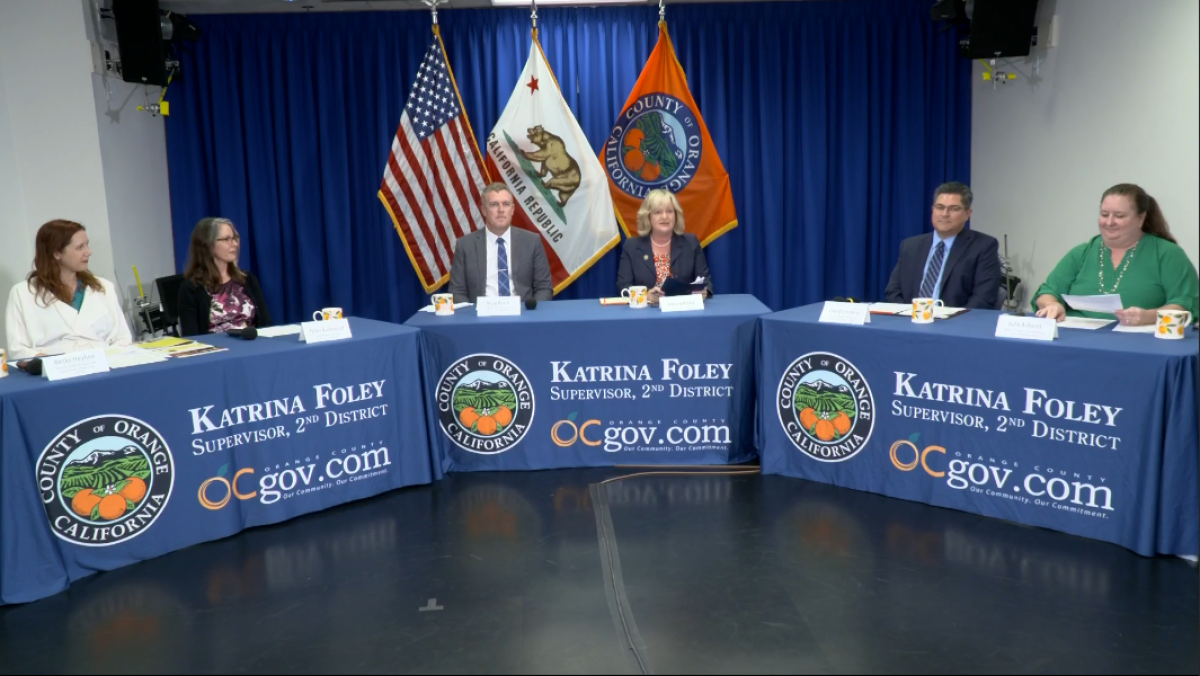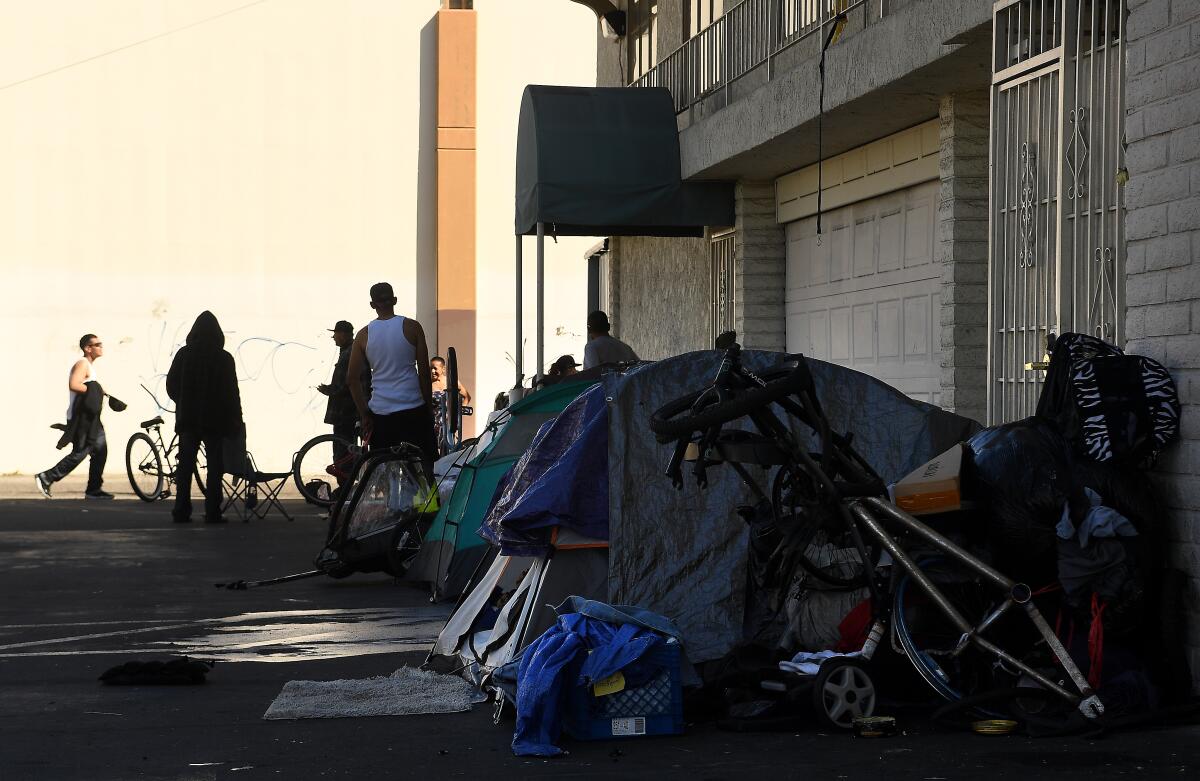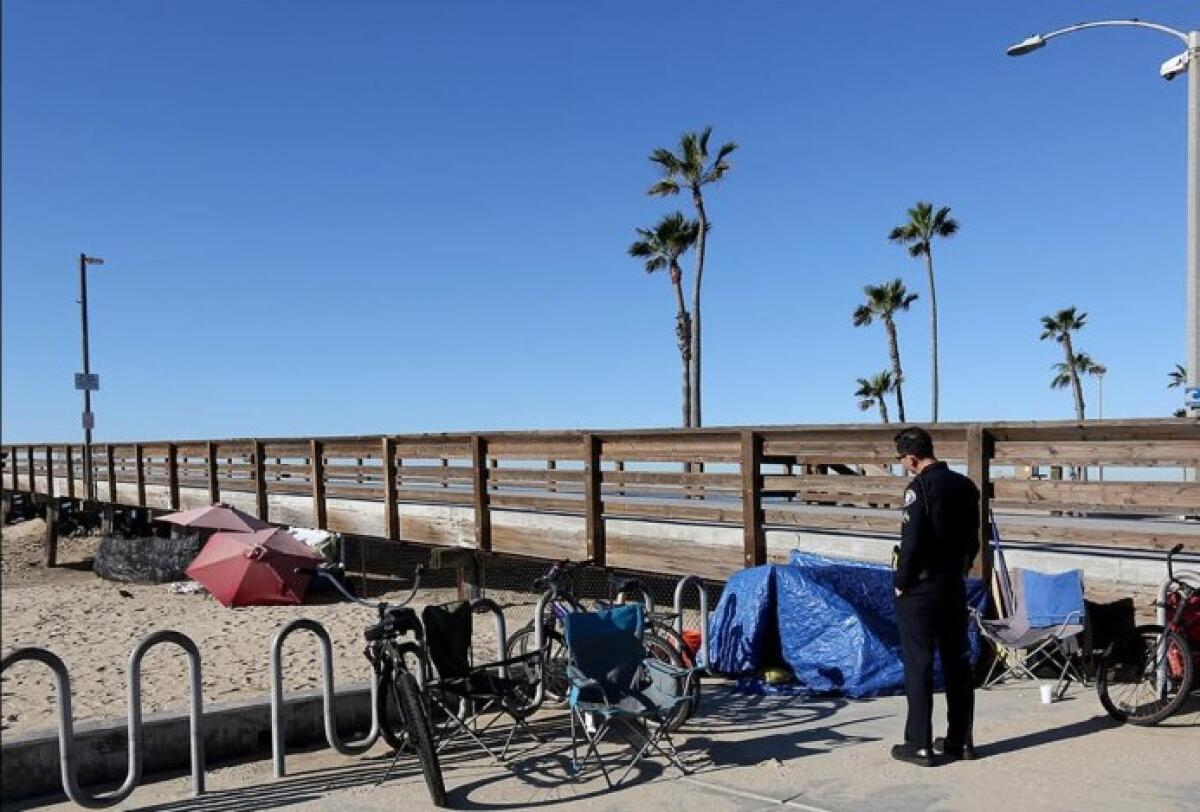O.C. housing agencies struggle with ‘unprecedented’ number of housing vouchers about to expire

- Share via
When Orange County received a record number of federal housing vouchers last year, it was seen as a major step toward solving the local homelessness crisis.
Since then, voucher holders have been challenged trying to find available homes in the county’s competitive market, and the expiration date for the vouchers is nearing.
This week, Orange County Supervisor Katrina Foley held a briefing with other county officials to address the challenges facing the county’s housing authority as it attempts to lease out the rest of its vouchers before the expiration date. The primary hurdle is a lack of landlords willing to accept the vouchers, officials said.
Foley said that the county received an “unprecedented” number of housing vouchers from the federal government, but it now needs to encourage landlords to work with the county to help fulfill them before they expire Dec. 31.
“If fully utilized, the emergency housing vouchers can help us to end homelessness,” Foley said.
The vouchers were a part of the American Rescue Plan Act, in which the federal government provided about 70,000 vouchers to nearly 700 public housing authorities across the country. Orange County received more than 1,000 vouchers that were divided up among the county’s four housing authorities.
The vouchers are meant to “assist individuals and families who are homeless, at risk of homelessness, fleeing, or attempting to flee, domestic violence, dating violence, sexual assault, stalking, or human trafficking, or were recently homeless or have a high risk of housing instability.”
Julia Bidwell, director of Orange County housing and community development, said the authority has received 421 referrals for vouchers so far; 140 of the voucher holders have been connected with housing, and 188 emergency voucher holders are searching for housing.
“Well, that’s a lot of work we have to do,” Foley said in response to the numbers.

David Cordero, executive director of the Apartment Assn. of Orange County, said property owners have historically not wanted to get involved with federal housing programs because they’re hesitant to deal with government bureaucracy.
However, Cordero said, many organizations are involved with the voucher process, so landlords aren’t just dealing with “a big government institution.”
The nonprofit association is partnering with the county for the emergency housing voucher program and represents more than 2,000 rental-property owners, operators and industry suppliers in Orange and Riverside counties, according to its website.
“Really, it’s about making this as easy for the housing providers as possible,” Cordero said. “The network of support that exists not only for the renters, but for the landlords, it really does make things very easy.”
Last month, the county also tried to attract more landlords by increasing the payment standards of the voucher to 120% of the fair market rent. Bidwell said this benefits landlords and voucher holders because it gets rent closer to market value and increases the “shopping power” of voucher holders.
Initially, voucher holders are responsible for 30% of the rent, and the county covers the rest. That can adjust over time, but voucher holders will never pay more than 40% of their income, Bidwell said.
Officials indicated the program is desirable for many landlords because it provides a steady stream of income and is low risk due to the government support.
Doug Becht, director of the county’s office of care coordination, said another benefit for landlords is that the county works with the Family Solutions Collaborative to help families acclimate to their new homes. This coalition of homeless services providers can act as a mediator if any problems come up between tenants and landlords.
“If there’s a road bump, you have a professional service, both for the household and the landlord, to really mitigate or be there to bridge the two parties,” he said.

United to End Homelessness, a program of Orange County United Way, received 475 of the vouchers from the county housing authority. Becks Heyhoe, executive director of United to End Homelessness, said during the briefing that the organization provides a number of incentives for property owners, including double security deposits, bonuses once a lease is signed, a damage mitigation fund, and holding fees so that the landlord isn’t losing out on potential income.
To get landlords involved in the voucher program, Heyhoe said the organization has gone door to door, advertised and engaged in online recruitment activities. United to End Homelessness has also asked community members to contact them if they see “for rent” signs.
“So the moment that we know that this is a unit that meets the rent reasonableness and we have got a client in our pipeline, which is a pretty strong guarantee that we will have somebody who can take advantage of that unit, we start paying holding fees,” Heyhoe said. “So an owner does not lose out on any income that they might have gathered if they put that unit into the market. So we’ll pay holding fees until that lease is signed, then we offer a double security deposit.”
In a past interview, Heyhoe mentioned that it has been difficult to find open units for emergency voucher holders in Orange County due to a lack of availability.
Heyhoe, like many in the industry, has said the county needs more permanent supportive housing to achieve the goal of ending homelessness. She backs the county’s plan to build 2,700 more units of permanent supportive housing, widely considered to be the key to ending chronic homelessness, in the next several years. A 2017 study by UC Irvine, Jamboree Housing and Orange County United Way found that it costs twice as much for someone to live on the street than to house them.
The county committed in 2018 to add 2,700 permanent supportive housing units by June 2025. So far, 395 permanent supportive housing units have been completed toward that goal. An additional 559 are under construction and 350 other units are being funded.
More to Read
Sign up for Essential California
The most important California stories and recommendations in your inbox every morning.
You may occasionally receive promotional content from the Los Angeles Times.











